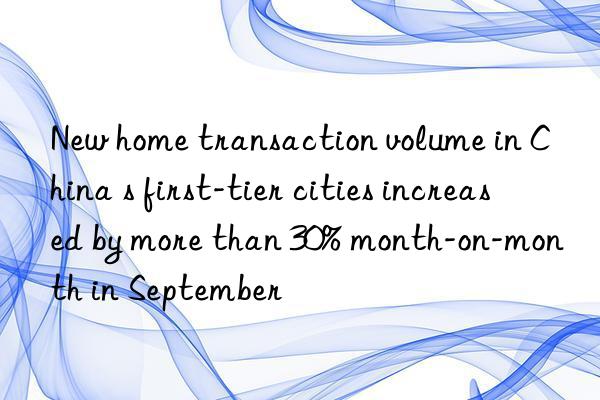
In the "Golden Nine" month, the traditional peak season for the property market in 2023, market activity in China's core cities has rebounded.
Chen Wenjing, market research director of the Zhongzhi Research Institute, revealed at a monthly real estate market situation analysis meeting on the 7th that according to the agency’s calculations, although the sales scale of the national real estate market was still at a low level in September, the activity of the new home market in core cities increased. The policy effects are beginning to show. That month, the transaction area of newly built commercial residential buildings in 100 key cities increased by approximately 14% month-on-month. Among them, the scale of new home transactions in first-tier cities increased by 32% month-on-month, second-tier representative cities increased by 13% month-on-month, and third- and fourth-tier representative cities increased by 10% month-on-month.
From the perspective of housing prices, driven by the entry of high-quality improvement projects in some cities, the prices of new homes in 100 cities increased month-on-month in September, with an increase of 0.05%; the prices of second-hand homes are still in a downward trend.
Since late August, China has intensively adjusted and optimized real estate-related policies across multiple departments and regions. According to statistics, the frequency of real estate-related policy adjustments and optimizations in September reached the highest level in a single month since the fourth quarter of last year. After sorting out the policies and measures that have been implemented in various places, Chen Wenjing said that there are four main categories:
First, the policy of “acknowledge the house but not the loan” for first-time housing is fully implemented, which has been basically implemented in all cities across the country.
The second is to clearly lower the lower limit of the down payment ratio for the first and second homes to 20% and 30%, and to lower the lower limit of the second home loan interest rate to the loan prime rate (LPR) plus 20 basis points for a term of more than 5 years. In the past, it was LPR plus 60 basis points. Chongqing, Shenyang, Dalian, Lanzhou and other cities have already implemented this policy.
The third is to reduce the existing first-home mortgage interest rates. Some home buyers said that their mortgage interest rates dropped by 100 basis points in one fell swoop, and they missed their monthly payment by more than 1,000 yuan (RMB).
The fourth is to optimize the purchase restriction policy. According to agency statistics, more than 10 cities including Dongguan, Foshan, and Shenyang have completely abolished housing purchase restrictions; more than 10 cities including Suzhou, Tianjin, Changsha, and Hangzhou have relaxed housing purchase restrictions targeting local areas, groups, or housing types.
Looking forward to the market outlook, Chen Wenjing believes that the current real estate policies in first-tier cities are still strict and the mortgage interest rates are high. Future real estate policy controls may mainly reduce the down payment ratio and mortgage interest rates for first and second homes in core cities; first-tier suburbs and Second-tier cities have relaxed purchase restrictions; Beijing and Shanghai have optimized the identification standards for ordinary residences.



 微信扫一扫打赏
微信扫一扫打赏
